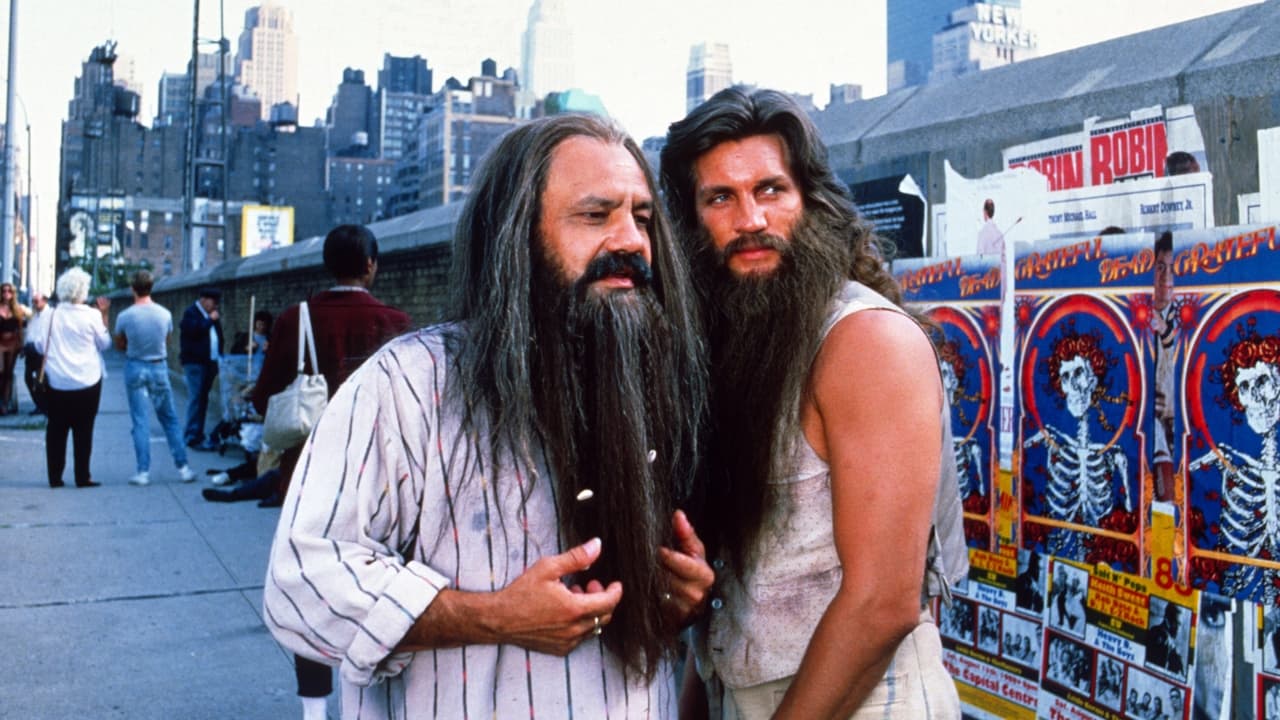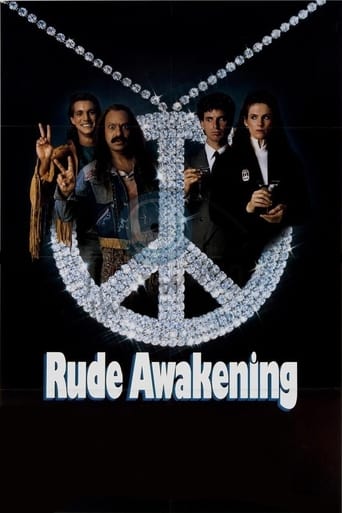

"Rude awakening" is a creative "fish out of water" scenario, including a talking, pot smoking fish. Eric Roberts and Cheech Marin escape to a South American utopia, avoiding the Vietnam War, but returning twenty years later to help stop another war. Problem is the "Hippie Movement" has moved on to materialistic endeavors. Thus the stage is set for Roberts and Marin trying to adjust to their friends cop out lives. The supporting cast here is excellent, with Julie Hagerty, Louise Lasser, and especially Buck Henry and Cindy Williams as the "Stools". Disillusioned by the apparent lack of interest for their "save the world" cause, Roberts and Marin refuse to give up, and eventually succeed. The movie is a great nostalgia trip for the right audience. - MERK
... View MoreThe hippie theme fascinates me. Although at the time the movement was too bold for me, I keep wondering whether I may have missed something. Thanks to the IMDb I was able to discover the film Rude Awakening, for it is advocated by visitors on the message board of the film Hair. I had already watched Hair and was dissatisfied because of its distortion of the original narrative in the musical. On the other hand I really liked the Swedish film Tillsammans (Together), and appreciated Strawberry Statement. Actually the hippie movement is probably universal, although the motorcycle and camper van aspect (Easy Rider!) appears to be typically American. I guess that the European countries are too small for that. Rude Awakening is presented as a comedy, which of course is just an alternative approach to narrate dramatic events. In the story two New York hippies, Fred and Hesus, have traveled in 1969 to a fictitious Latin American state in order to found a commune in the jungle. They have embraced the soft drug culture, and make a living by growing hemp for the production of hashish. (By the way, in the Netherlands the cultivation of hemp for the production of hash is illegal but the sale of soft drugs isn't). Fred is obviously the leader of the colony, and Hesus has become an addicted zombie, who takes anything that might be hallucinatory. Although the addiction of Hesus looks hilarious, in real life it is fairly commonplace. Therefore his role is perhaps meant to be a warning signal: a history of even moderate hash consumption will lead to severe symptoms at old age. In 1989 a CIA agent is fatally wounded by the local revolutionary army, and in his last moments hands over to Fred a secret dossier about a forthcoming American invasion. Fred decides to alert the American public, and returns to New York, together with Hesus, who follows him more or less like a pet. Fred reanimates his former contact in the hippie movement, notably the former commune members Petra and Sammy. However, Petra and Sammy have done extremely well, and have made careers for themselves. It is understandable, that they are shocked to see their former acquaintances, and loathe the appearance of Hesus. But here the story takes a strange turn, because suddenly Petra and Sammy regress into their abjured hippie attitude. Clearly Rude Awakening is not meant to be a study of characters. In the mean time the FBI starts to hunt Fred in an attempt to recover the secret dossier. Here Hesus plays a heroic and illogical part, when during a gun fight he manages to disarm one of the FBI agents. The quartet decides to occupy the main building on the N.Y. university campus. From its balcony Fred informs the crowd of students about the forthcoming invasion and tries to stir a rebellion. However, the times have changed since 1969, and his speech only serves to increase the already bellicose spirit of the American people. (An old lady sighs: "We have not won something for a long time"). Fred collapses in despair, and loathes his former vegetating life in the jungle. Still he decides to return to the jungle (it remains a mystery why), but just then a group of students appeals to him for guidance in the renewal of the civil movement. This climax is apparently the definite acknowledgment of the avant-garde function of the movement of 68, and its lasting influence on society. Unfortunately Rude Awakening has too many evident weaknesses. The characters lack logic and depth, the dialogs are superficial and childish, and many of the events are absurd. Some instances may provide food for thought and meditation, like the balcony scene, where Fred asks: "How is my hair?" Remember that hair is a symbol of the movement of 68, the name of another hippie film etc. But this is just not enough for a film that pretends to be a reflection on an influential cultural and historical movement. So maybe this protest movement features as nothing more than a backcloth for jokes. Rude Awakening is too lighthearted and senseless for my taste, and I recommend Tillsammans or Strawberry Statement instead.
... View MoreIn 1969, peace loving hippies Eric Roberts (as Fred) and Cheech Marin (as Hesus) flee to Central America, to avoid being drafted into Vietnam War service. Why the US government believes Mr. Marin would be of any real use during warfare is never explained; but, Mr. Roberts looks like a major Commie-killing loss. Anyway, they spend the next 20 years hiding in the jungle, smoking marijuana, and enjoying peace. Their hippie friends, Julie Hagerty (as Petra) and Robert Carradine (as Sammy), remain behind. While in Central America, Roberts and Marin learn about a US invasion plan, and decide to return to New York, and stop the war. They are in for a rude awakening...In 1989, the peace movement appears dead. Roberts and Marin try to adapt to the changes in American society. They try to re-connect with Ms. Hagerty and Mr. Carradine, who have become materialistic yuppies. How can they erase their friends' 1980s brainwashing, avoid capture by perseverating FBI man Cliff De Young (as Brubaker), and stop the war?Aaron Russo and Neil Levy's underrated "Rude Awakening" certainly doesn't always work; but, it's funny more often than not. Roberts and Marin are almost a satirical casting in-joke (sixties, meet the eighties). One of the film's most obvious misses is that the main attempt to transcend a 20-year-gap is an unconvincing pair of pasted-on beards. Although, to answer Roberts' later, more general question, "How's my hair?" Great. It's impossible to hold back laughing at Marin's first meeting with the "fish". But, they should have used Don Knotts voice. Of the four "hippie" friends, Carradine's is, performance-wise, most convincing. Check out Louise Lasser (as Ronnie)'s customers! The highlight of the film is a terrific "cocktail party" hosted by Carradine and uptight wife Cindy Williams (as June). They are visited by the "Stools", Buck Henry (as Lloyd) and Andrea Martin (as April). A cocktail party attended by Cheech Marin, Eric Roberts, Robert Carradine, Buck Henry, Cindy Williams, and Andrea Martin is every bit as funny as it sounds. If only they could have figured out how to get Lasser there (and the overhead mike out). There are enough funny moments, all around; but, the hilarious supporting characterizations by Martin and Williams, alone, make this well worth watching.****** Rude Awakening (1989) Aaron Russo ~ Eric Roberts, Cheech Marin, Andrea Martin
... View MoreThis appeared at a convenient point in time for pop culture self-examination through the movies; the narrative intent is that we can review the 1980s through the lens of 1960s thinking.It starts off with a 'reprogramming' of a dropout via LSD and movie indoctrination. This could have been something clever...instead it deteriorates by hallucinating through "Up In Smoke" and Leone westerns.The 'ideal world' is depicted as "Woodstock", with the main characters stolen out of "Easy Rider". They take an excursion through "Salvador" and "The Mosquito Coast". The whole thing, production-wise, staggers about in a manner as clumsy as "Where the Buffalo Roam" and "Animal House". It resolves through "Deer Hunter", "Stripes" and the Beatles' 'Revolution'.The point of all this is to tear down the detached, colorless, sexless, 'boozh-wa' 1980s and reindoctrinate the audience to 'the truth' with the 'romantic' drug of the movie. An audience is assembled in the movie to first provoke (in us)the intended feeling of 'guilt', and the second time to sublimate into 'activism'. As I wrote earlier, it's just not clever. The problem is, it doesn't know how to target the comedic center. Everything ends up as a target, including Roberts because he doesn't know how to play this in a smart way -- there's no winking at the viewer. The producers thought this was 'affirming', oblivious to the joke on themselves.
... View More